现在分词和过去分词
现在分词与过去分词的用法
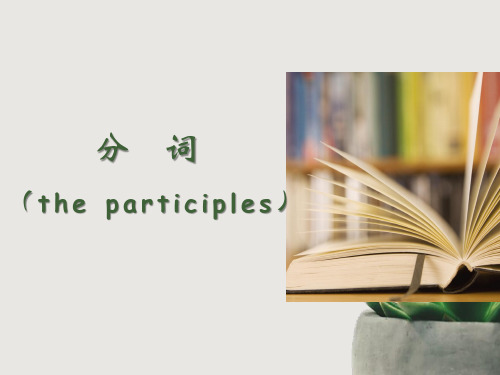
*现在分词短语作( 时间状语 ) *Having finished their homework表现的动作在
went home(之前),故用分词的( 完成式 ).
2.1.Because he was ill, he couldn’t go to school.
Being ill, he couldn’t go to school.
单个的动词-ed形式,一般放在被修饰
的名词的前面, 作前置定语。
②后置定语
1. everything used 2. the people invited 3. the books left
单个动词的-ed形式, 如left等, 只能 作后置定语。
1.2 定语(分词短语)
正在建房那些人是我的朋友. 去年建造的那座房子将要拆除. 正在建造的那座房子将是个商店.
Shiyan Town.
(√)
*现在分词所表示的动作由句子的主语发出
=When we stand at the top of the hill, we can see Shiyan Town.
2. Seen from the top of the hill, we can
see the whole town.
( =As all the tickets have been sold out)
四、分词的独立结构*
4、He was taking a walk, with his dog following him. =He was taking a walk and his dog followed him.
5.The teacher came into the classroom,
following by six students. (×)
现在分词和过去分词作定语的区别
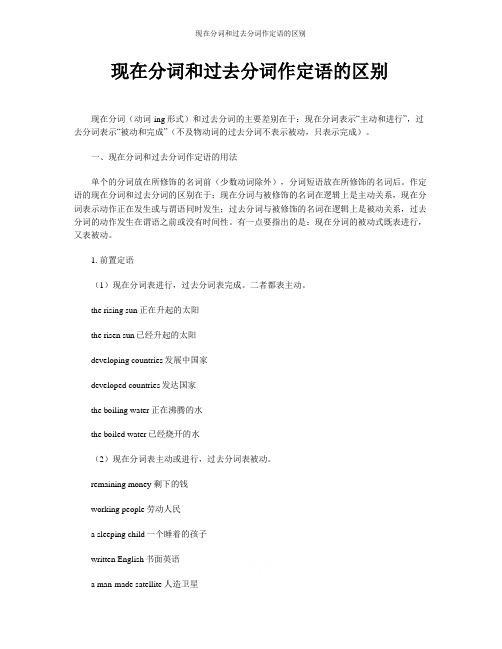
现在分词和过去分词作定语的区别现在分词(动词-ing形式)和过去分词的主要差别在于:现在分词表示“主动和进行”,过去分词表示“被动和完成”(不及物动词的过去分词不表示被动,只表示完成)。
一、现在分词和过去分词作定语的用法单个的分词放在所修饰的名词前(少数动词除外),分词短语放在所修饰的名词后。
作定语的现在分词和过去分词的区别在于:现在分词与被修饰的名词在逻辑上是主动关系,现在分词表示动作正在发生或与谓语同时发生;过去分词与被修饰的名词在逻辑上是被动关系,过去分词的动作发生在谓语之前或没有时间性。
有一点要指出的是:现在分词的被动式既表进行,又表被动。
1. 前置定语(1)现在分词表进行,过去分词表完成。
二者都表主动。
the rising sun正在升起的太阳the risen sun已经升起的太阳developing countries发展中国家developed countries发达国家the boiling water正在沸腾的水the boiled water已经烧开的水(2)现在分词表主动或进行,过去分词表被动。
remaining money 剩下的钱working people劳动人民____________a sleeping child一个睡着的孩子written English书面英语a man-made satellite人造卫星a newly-built school新修的学校the exciting news令人激动的消息the excited people感到激动的人们a puzzling problem令人迷惑的问题a puzzled look感到迷惑的表情2.后置定语(1)现在分词的主动式表主动或进行;过去分词在语态上表被动,在时间上或表过去发生,或表没有时间性。
There are 20 people working for the project. 有20人参与这个项目。
现在分词和过去分词
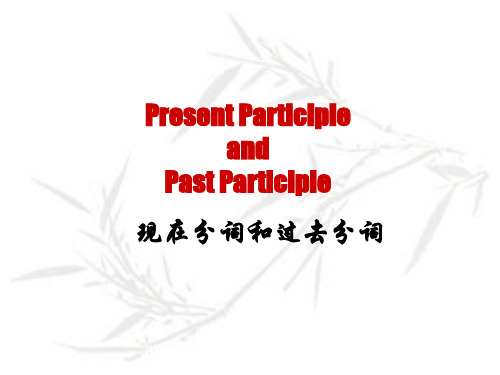
3) 现在分词的一般式的被动语态:
Seeing a robber, I ran away. =Because I saw a robber, I ran away.
Hit by a bullet, the soldier fell from the horse.
= Because he was hit by a bullet, the soldier fell from the horse.
=After we were taken round the city, we were impressed by the city’s new look.
Note: 分词表示时间,为了强调,有时在分词前加 while , when, after , before , on
When/While looking through the paper,I noticed a few mistakes. On hearing the good news, we went to a restaurant to cheer our winning.
=When the students heard the bell, they went into the classroom.
Falling asleep, he dreamed he was far away.
=When he fell asleep, he dreamed he was far away. Taken round the city, we were impressed by the city’s new look.
过去分词与现在分词的区别
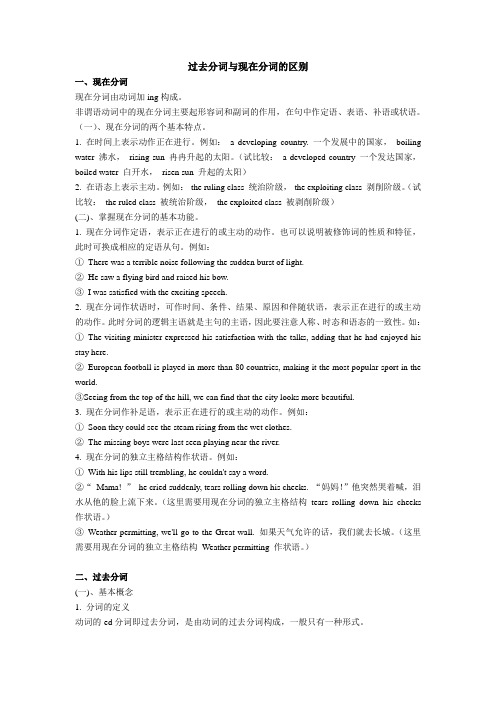
过去分词与现在分词的区别一、现在分词现在分词由动词加ing构成。
非谓语动词中的现在分词主要起形容词和副词的作用,在句中作定语、表语、补语或状语。
(一)、现在分词的两个基本特点。
1. 在时间上表示动作正在进行。
例如:a developing country. 一个发展中的国家,boiling water 沸水,rising sun 冉冉升起的太阳。
(试比较:a developed country 一个发达国家,boiled water 白开水,risen sun 升起的太阳)2. 在语态上表示主动。
例如:the ruling class 统治阶级,the exploiting class 剥削阶级。
(试比较:the ruled class 被统治阶级,the exploited class 被剥削阶级)(二)、掌握现在分词的基本功能。
1. 现在分词作定语,表示正在进行的或主动的动作。
也可以说明被修饰词的性质和特征,此时可换成相应的定语从句。
例如:①There was a terrible noise following the sudden burst of light.②He saw a flying bird and raised his bow.③I was satisfied with the exciting speech.2. 现在分词作状语时,可作时间、条件、结果、原因和伴随状语,表示正在进行的或主动的动作。
此时分词的逻辑主语就是主句的主语,因此要注意人称、时态和语态的一致性。
如:①The visiting minister expressed his satisfaction with the talks, adding that he had enjoyed his stay here.②European football is played in more than 80 countries, making it the most popular sport in the world.③Seeing from the top of the hill, we can find that the city looks more beautiful.3. 现在分词作补足语,表示正在进行的或主动的动作。
现在分词和过去分词
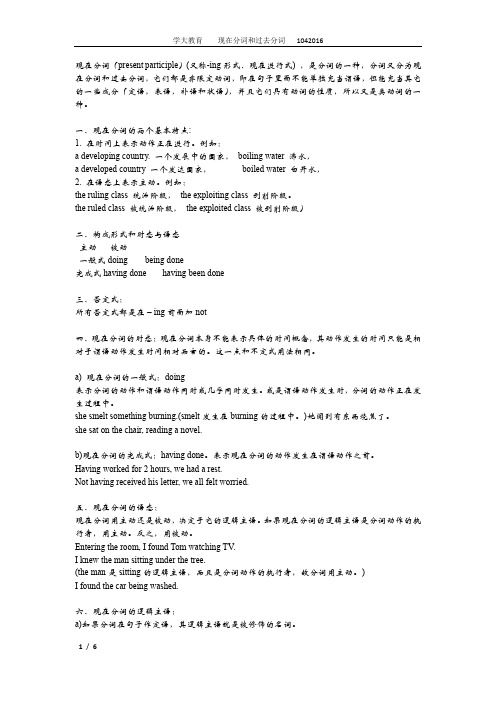
现在分词(present participle)(又称-ing形式、现在进行式) ,是分词的一种,分词又分为现在分词和过去分词,它们都是非限定动词,即在句子里面不能单独充当谓语,但能充当其它的一些成分(定语,表语,补语和状语),并且它们具有动词的性质,所以又是类动词的一种。
一、现在分词的两个基本特点:1. 在时间上表示动作正在进行。
例如:a developing country. 一个发展中的国家,boiling water 沸水,a developed country 一个发达国家,boiled water 白开水,2. 在语态上表示主动。
例如:the ruling class 统治阶级,the exploiting class 剥削阶级。
the ruled class 被统治阶级,the exploited class 被剥削阶级)二、构成形式和时态与语态主动被动一般式doing being done完成式having done having been done三、否定式:所有否定式都是在-ing前面加not四、现在分词的时态:现在分词本身不能表示具体的时间概念,其动作发生的时间只能是相对于谓语动作发生时间相对而言的。
这一点和不定式用法相同。
a) 现在分词的一般式:doing表示分词的动作和谓语动作同时或几乎同时发生。
或是谓语动作发生时,分词的动作正在发生过程中。
she smelt something burning.(smelt发生在burning的过程中。
)她闻到有东西烧焦了。
she sat on the chair, reading a novel.b)现在分词的完成式:having done。
表示现在分词的动作发生在谓语动作之前。
Having worked for 2 hours, we had a rest.Not having received his letter, we all felt worried.五、现在分词的语态:现在分词用主动还是被动,决定于它的逻辑主语。
现在分词和过去分词

分词的作用:做定语 分词的作用:
2. 分词作定语时,逻辑主语是被修饰的词, 即中心词。具体说,中心词发出发出动作, 就用现在分词作定语;中心词承受分词动 作,就用过去分词作定语。 a crying baby an adopted child an interesting story some excited audience
非谓语动词2 非谓语动词2:分词
分词分为现在分词和过去分词,现在 分词由动词加ing构成,规则动词过 分词由动词加ing构成,规则动词过 去分词由动词加ed构成。 去分词由动词加ed构成。
现在分词和过去分词的区别
1.现在分词表主动,过去分词表被动,如: 1.现在分词表主动,过去分词表被动,如: working people 劳动人民 unning water 流水 a criticized student 挨了批评的学生 the driving wheel 主动轮 the driven wheel 从动轮
分词做表语
1. 分词作表语时逻辑主语是句子的主语,注意这时的分 词相当于形容词,用来表示主语的特点或状况。 The exam result is satisfying, and the teacher is satisfied. My cup is broken. (杯子是烂的) The sunlight is burning, you’d better hold an umbrella. 2.分词作表语时需与谓语动词的进行时和被动句区分开 2.分词作表语时需与谓语动词的进行时和被动句区分开 来,谓语动词表动作,系表结构表特点或状态。试区别: 来,谓语动词表动作,系表结构表特点或状. This model plane was broken by my daughter yesterday.
现在分词和过去分词的区别
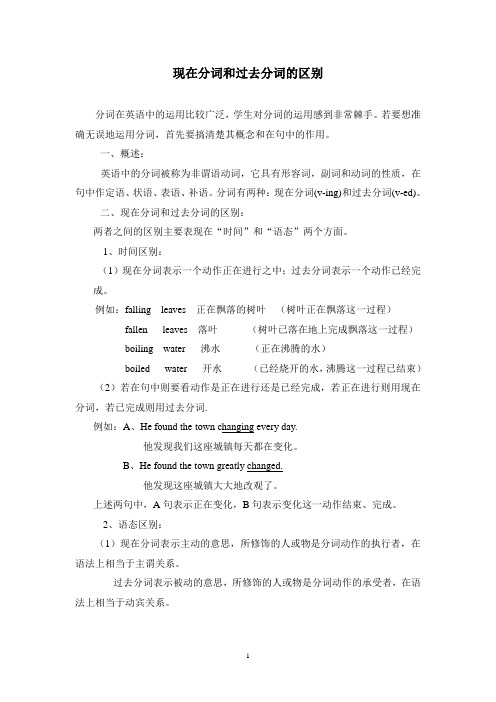
现在分词和过去分词的区别分词在英语中的运用比较广泛,学生对分词的运用感到非常棘手。
若要想准确无误地运用分词,首先要搞清楚其概念和在句中的作用。
一、概述:英语中的分词被称为非谓语动词,它具有形容词,副词和动词的性质,在句中作定语、状语、表语、补语。
分词有两种:现在分词(v-ing)和过去分词(v-ed)。
二、现在分词和过去分词的区别:两者之间的区别主要表现在“时间”和“语态”两个方面。
1、时间区别:(1)现在分词表示一个动作正在进行之中;过去分词表示一个动作已经完成。
例如:falling leaves 正在飘落的树叶(树叶正在飘落这一过程)fallen leaves 落叶(树叶已落在地上完成飘落这一过程)boiling water 沸水(正在沸腾的水)boiled water 开水(已经烧开的水,沸腾这一过程已结束)(2)若在句中则要看动作是正在进行还是已经完成,若正在进行则用现在分词,若已完成则用过去分词.例如:A、He found the town changing every day.他发现我们这座城镇每天都在变化。
B、He found the town greatly changed.他发现这座城镇大大地改观了。
上述两句中,A句表示正在变化,B句表示变化这一动作结束、完成。
2、语态区别:(1)现在分词表示主动的意思,所修饰的人或物是分词动作的执行者,在语法上相当于主谓关系。
过去分词表示被动的意思,所修饰的人或物是分词动作的承受者,在语法上相当于动宾关系。
例如:①a moving film.一部感人的影片。
(影片内容感动)= a film moves people.(主谓关系)S V②the moved students. 受感动的学生们= the Ss are moved by ……(动宾→宾语被置于主语的位置,采用被动的语态)S V(2)若在句中,则要看与全句的主语或其逻辑主语之间的关系,是主动用现在分词,若为被动,则要用过去分词。
现在分词与过去分词的区别

现在分词与过去分词的区别:1,语态上不同:现在分词表主动,而及物动词的过去分词表被动.2,时间关系上不同:现在分词表正在进行的动作,过去分词表示已经过去的动作.3,选用现在分词还是过去分词取决于分词所表示的动作与逻辑主语之间的时间关系.分词短语作状语,其逻辑主语是句子的主语.分词的形式:以vt:write和vi:go为例,1,现在分词:主动语态writing 被动语态being written 主动语态going2,过去分词: 只有一种形式 written gone现在分词和过去分词主要的区别表现在语态和时间关系上。
1)语态上不同:现在分词表示主动的意思,而过去分词多由及物动词变来,表示被动的意思。
试比较:surprising 使人感到惊讶的(主动)surprised 自己感到惊讶的(被动,即被惊讶的)an exciting story 一个令人兴奋的故事(主动)excited spectators 激动的观众(被动,即被引起激动的)a moving film 一部感动人的影片。
A moved audience 受感动的观众A tiring journey 累人的旅行A tired football player 累了的足球运动员He told us many interesting things last night.他昨夜告诉我们许多有趣的事情。
She is interested in astronomy. 她对天文学有兴趣。
也有一些过去分词是由不及物动词变来的,它们只表示一个动作已完成,没有被动的意味。
如:the risen sun 升起的太阳fallen leaves 落叶the exploded bomb 已爆炸了的炸弹a retired miner 退休矿工returned students 归国留学生2)时间关系上不同:一般说来,现在分词所表示的动作往往正在进行,而过去分词所表示的动作,往往已经完成。
现在分词与过去分词的区别与用法解析
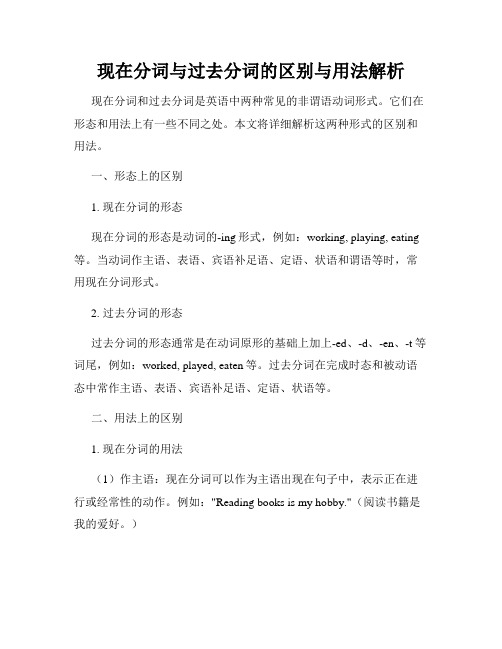
现在分词与过去分词的区别与用法解析现在分词和过去分词是英语中两种常见的非谓语动词形式。
它们在形态和用法上有一些不同之处。
本文将详细解析这两种形式的区别和用法。
一、形态上的区别1. 现在分词的形态现在分词的形态是动词的-ing形式,例如:working, playing, eating 等。
当动词作主语、表语、宾语补足语、定语、状语和谓语等时,常用现在分词形式。
2. 过去分词的形态过去分词的形态通常是在动词原形的基础上加上-ed、-d、-en、-t等词尾,例如:worked, played, eaten等。
过去分词在完成时态和被动语态中常作主语、表语、宾语补足语、定语、状语等。
二、用法上的区别1. 现在分词的用法(1)作主语:现在分词可以作为主语出现在句子中,表示正在进行或经常性的动作。
例如:"Reading books is my hobby."(阅读书籍是我的爱好。
)(2)作定语:现在分词可以修饰名词作定语,常表示主动、进行或经常性的动作。
例如:"The running water is very clear."(流动的水非常清澈。
)(3)作宾语补足语:现在分词可以作及物动词的宾语补足语,表示正在进行或经常性的动作。
例如:"I saw him painting the house."(我看见他正在刷房子。
)2. 过去分词的用法(1)作主语:过去分词可以作为主语出现在句子中,表示完成的动作或状态。
例如:"Broken glass covered the ground."(破碎的玻璃铺满了地面。
)(2)作定语:过去分词可以修饰名词作定语,表示被动或完成的动作。
例如:"The lost key has been found."(丢失的钥匙已经找到了。
)(3)作宾语补足语:过去分词可以作及物动词的宾语补足语,表示完成的动作或状态。
非谓语动词之现在分词和过去分词

现在分词与过去分词的区别:
1.语态上:现在分词表主动,过去分词表被动 Do you know the woman talking to Tom? The soldier killed in the war was a doctor.
2. 时态上:现在分词表进行,过去分词表完成 Developing country发展中国家 Developed country 发达国家
2. SSeeeeing from the hill, the city is more beautiful.
3. HHeeaattiendg , water will boil.
We must do a lot of practice.
4. Getting there, the door was found opened.
If they had been given more
attention
Being so angry, he couldn’t go to sleep.
Because he was so angry
They came into the classroom, singing and laughing.
Grammar
非谓语动词 之
现在分词和过去分词
分词:Participles
一 分词的概述
1. 分词是“非谓语动词”的另一种形式,它有两种形式: 现在分词(Present Participle)和过去分词(Past Participle)。 2. 现在分词:doing
过去分词:done
3.分词在句中起形容词和副词的作用。在句中 作表语、定语状语和宾语补足语。
The bridge built last month needs repairing. 上个月建造的那座桥需要修理。
现在分词与过去分词的区别

现在分词与过去分词的主要区别现在分词和过去分词主要的区别表现在语态和时间关系上。
笔者想结合分词在定语、补语、状语及独立主格结构中的用法谈谈现在分词与过去分词的主要区别。
一、现在分词与过去分词当定语现在分词与过去分词当定语的区别首先表现在被修饰词与现在分词之间是主动关系,过去分词当定语时被修饰的词与分词之间则是被动关系。
单个分词作定语通常置于被修饰词之前,分词短语则要后置。
例如:The president made an inspiring speech(= which was inspiring)at the meeting.总统在会上作了令人鼓舞的演说。
The man sitting (= who is sitting) at the desk is his secretary. 坐在桌旁那个人是他的秘书。
The moved children (= who were moved) were determined to work harder at their lessons.受感动的孩子们决心更加努力地学习功课。
She showed me the book recommended by the professor (=which was recommended ).她把教授推荐的书给我看了看。
现在分词与过去分词当定语的另一个区别是现在分词表示动作正在进行,过去分词则表示动作已经完成。
例如:It is well known that China belongs to a developing country.众所周知,中国属于发展中国家。
We are determined to work harder so as to catch up with the developed countries.我们决心更加努力工作以便赶上发达国家。
不及物动词的过去分词只表示动作完成,没有被动含义。
I was watching the risen moon on the balcony when the telephone rang.我正在阳台上看升起了的月亮突然间电话铃响了。
现在分词和过去分词的用法区别
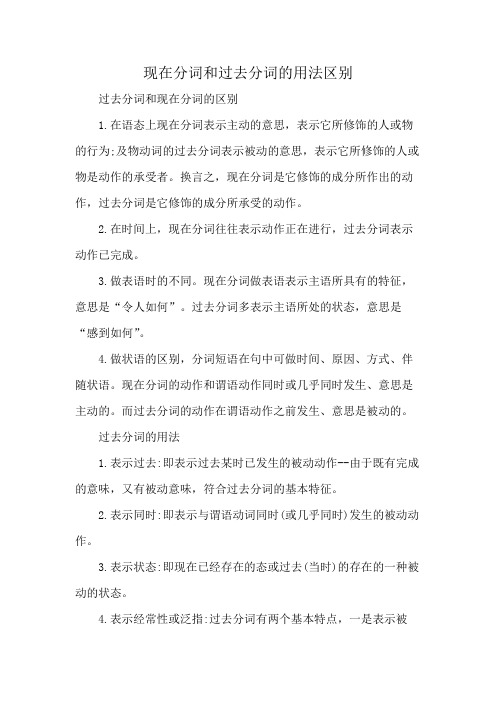
现在分词和过去分词的用法区别
过去分词和现在分词的区别
1.在语态上现在分词表示主动的意思,表示它所修饰的人或物的行为;及物动词的过去分词表示被动的意思,表示它所修饰的人或物是动作的承受者。
换言之,现在分词是它修饰的成分所作出的动作,过去分词是它修饰的成分所承受的动作。
2.在时间上,现在分词往往表示动作正在进行,过去分词表示动作已完成。
3.做表语时的不同。
现在分词做表语表示主语所具有的特征,意思是“令人如何”。
过去分词多表示主语所处的状态,意思是“感到如何”。
4.做状语的区别,分词短语在句中可做时间、原因、方式、伴随状语。
现在分词的动作和谓语动作同时或几乎同时发生、意思是主动的。
而过去分词的动作在谓语动作之前发生、意思是被动的。
过去分词的用法
1.表示过去:即表示过去某时已发生的被动动作--由于既有完成的意味,又有被动意味,符合过去分词的基本特征。
2.表示同时:即表示与谓语动词同时(或几乎同时)发生的被动动作。
3.表示状态:即现在已经存在的态或过去(当时)的存在的一种被动的状态。
4.表示经常性或泛指:过去分词有两个基本特点,一是表示被
动,二是表示完成。
现在分词的用法
1.现在分词的一般式所表示的动作与主语动作同时发生。
2.当要表示一个被动动作时,现在分词就用被动形式。
3.分词的否定式总是将否定词not置于分词之前,遇上现在分词的完成式、被动式以及完成被动式,否定词应置于整个结构之前。
现在分词与过去分词的差别
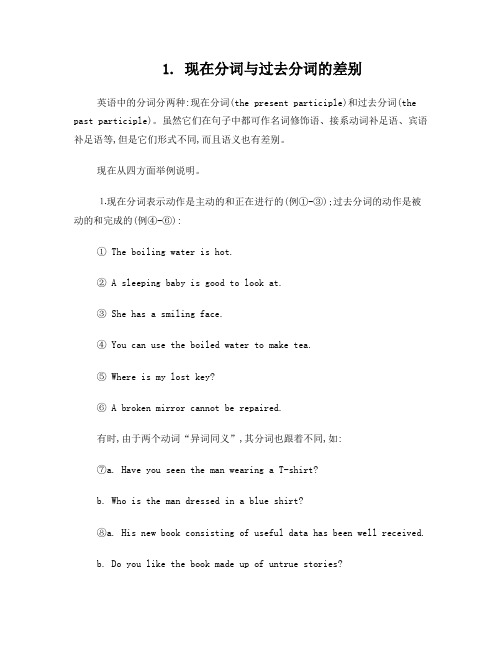
1. 现在分词与过去分词的差别英语中的分词分两种:现在分词(the present participle)和过去分词(the past participle)。
虽然它们在句子中都可作名词修饰语、接系动词补足语、宾语补足语等,但是它们形式不同,而且语义也有差别。
现在从四方面举例说明。
⒈现在分词表示动作是主动的和正在进行的(例①-③);过去分词的动作是被动的和完成的(例④-⑥):① The boiling water is hot.② A sleeping baby is good to look at.③ She has a smiling face.④ You can use the boiled water to make tea.⑤ Where is my lost key?⑥ A broken mirror cannot be repaired.有时,由于两个动词“异词同义”,其分词也跟着不同,如:⑦a. Have you seen the man wearing a T-shirt?b. Who is the man dressed in a blue shirt?⑧a. His new book consisting of useful data has been well received.b. Do you like the book made up of untrue stories?⒉在语义上,现在分词和过去分词反映的心理状态不同。
前者有“令人……”的含义(见例⑨);过去分词则有“感到……”的意思(见例⑩):⑨ The soccer match last night was thrilling.(令人紧张)⑩ The soccer fans were delighted.(感到高兴)其他例子有:● amazing: amazed● annoying: annoyed● boring: bored● confusing: confused● surprising: surprised● terrifying: terrified试比较11a和b以及12a和b:11a. This is the most confusing system I have ever seen.11b. The children will get confused if asked to learn too much at a time.12a. David came with some surprising news.12b. All were surprised at Sam’s sudden resignation.⒊在作宾语补足语时,如果宾语是有关分词逻辑上的主语,就用现在分词,如 :13. The teacher found a student dozing off.14. Don’t keep the visitor waiting.如果宾语和有关分词有“动词+宾语”关系,那么这个分词就要是过去分词了,如:15. Where did you get your book printed?16. You should have your office whitewashed.在13里,正在打瞌睡的是宾语“a studen t“;在14里,宾语是“the visitor”。
过去分词与现在分词的区别

过去分词与现在分词的区别一、现在分词现在分词由动词加ing构成。
非谓语动词中的现在分词主要起形容词和副词的作用,在句中作定语、表语、补语或状语。
(一)、现在分词的两个基本特点。
1. 在时间上表示动作正在进行。
例如:a developing country. 一个发展中的国家,boiling water 沸水,rising sun 冉冉升起的太阳。
(试比较:a developed country 一个发达国家,boiled water 白开水,risen sun 升起的太阳)2. 在语态上表示主动。
例如:the ruling class 统治阶级,the exploiting class 剥削阶级。
(试比较:the ruled class 被统治阶级,the exploited class 被剥削阶级)(二)、掌握现在分词的基本功能。
1. 现在分词作定语,表示正在进行的或主动的动作。
也可以说明被修饰词的性质和特征,此时可换成相应的定语从句。
例如:①There was a terrible noise following the sudden burst of light.②He saw a flying bird and raised his bow.③I was satisfied with the exciting speech.2. 现在分词作状语时,可作时间、条件、结果、原因和伴随状语,表示正在进行的或主动的动作。
此时分词的逻辑主语就是主句的主语,因此要注意人称、时态和语态的一致性。
如:①The visiting minister expressed his satisfaction with the talks, adding that he had enjoyed his stay here.②European football is played in more than 80 countries, making it the most popular sport in the world.③Seeing from the top of the hill, we can find that the city looks more beautiful.3. 现在分词作补足语,表示正在进行的或主动的动作。
现在分词与过去分词的区别

3.分词作宾语补足语
现在分词在see, watch, hear, observe, notice, feel, find, glimpse, glance等感官动词和look at, listen to等短语动词以及have, keep, get, catch, leave, set, start, send等使役 动词后面与名词和代词构成复合宾 语,作宾语补语的成分。
A ,the museum will be open to the 4. When _ public next year. A. completed B. completing C. being completed D. to be completed B to his research, he almost forgot 5. _ everything. A. Devoting B. Devoted C. To devote D. Devote
例如
1、On the top of the hill, we could see smoke rising from the chimneys in the village. 2、The boy sat beside the railway line and watched the trains roaring by. 3、We should not leave him wondering what he should do. 4、I am sorry to have kept you waiting for such a long time. 5、I caught him doing something else in class.
◆ The result of the test is
现在分词与过去分词的区别

A. drink B. to drink C. drinking D. drunk
20.I appreciated ________ the opportunity to study abroad two years ago.
Not knowing what to do, he went to his parents for help.
由于不知如何办是好,他去找父母帮忙。
Smiling, they came in.
2)过去分词作状语时,过去分词表示的动作是句子主语承受的动作,它们之间的关系是被动关系。
9.He is an ________ teacher.
A. advancing B. advanced C. being advancing D. advance
10.________ exceptions, the rule may stand.
A. Allow for B. Allowing for C. To allow D.To allow for
Travelling is interesting but tiring.旅行是有趣的,但是使人疲劳。
The pupils will get confused if they are made to learn too much.
如果要学生学得太多,他们会感到糊涂的。
The game is exciting. (现在分词作表语)
8.The bank is reported in the local newspaper ________ in broad daylight yesterday.
现在分词和过去分词
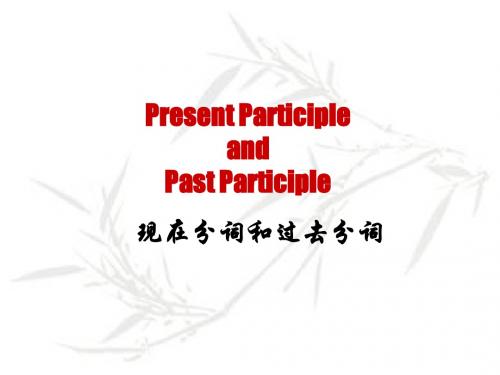
把下列句子合并成一句并把动词改成其分词形式:
1) There were a lot of people who were standing there. There were a lot of people standing there. 2) I saw him. He was listening to the radio. I saw him listening to the radio. 3) Many people are looking for the treasure which is hidden. Many people are looking for the hidden treasure. 4) When Mr Chen stayed in China, he felt very happy. Staying in China, Mr Chen felt quite happy. 5) After she had stayed in China for a long time, Miss Li came to love it. Having stayed in China for a long time, Miss Li came to love it.
Having finished the course, I had an exam.
Participle (phrases) used
as
adverbial
分词做状语
1.时间状语
Hearing the bell, the students went into the classroom
=When the students heard the bell, they went into the classroom.
- 1、下载文档前请自行甄别文档内容的完整性,平台不提供额外的编辑、内容补充、找答案等附加服务。
- 2、"仅部分预览"的文档,不可在线预览部分如存在完整性等问题,可反馈申请退款(可完整预览的文档不适用该条件!)。
- 3、如文档侵犯您的权益,请联系客服反馈,我们会尽快为您处理(人工客服工作时间:9:00-18:30)。
We came running all the way. (方式状语)
= We came and we ran all the way.
方式状语 ( stand , go , come , sit )
He stood leaning against the wall They come into the room, running.
6) There being no bus, Joe took a taxi.
7) The meeting being over, they all left the room.
三. 现在分词的
时态和语态变化
1) 分词的一般式:
在路上走的时候,他发现了一支钢笔。
When he was walking along the street, he found a pen. Walking along the street, he found a pen. (同时发生 ) When walking a long the street , … After she returned home, my friend learned that the police had been to the flats. Returning home, my friend learned that the police had been to the flats. (几乎同时发生)
The students went into the classroom.
Following their teacher, the students went into the classroom.
2) 现在分词的完成式:
在做完作业之后,他出去散步了。 After he had finished his homework, he went out for a walk. Having finished his homework, he went out for a walk.
Having finished the job, he left.
=After he finished/had finished the job... Having seen the girl twice, I can recognize her. =Because I have seen the girl twice… Having been surrounded by the flood for three days, we are short of food. 结论:动作先于谓语用having done
Translation:
4.因为是周日,我们出去野炊。
5.时间允许,我会做的更好。
6.没有公共汽车,Joe乘了出租车。
7.会议结束,他们都离开了房间
4)It being Sunday,we went out for a picnic.
5)Time permitting, Iwill do it better.
4.伴随状语 伴随状语(后置)=and (sb) did / was doing sth
She sat in a sofa, watching TV.
=She sat in a sofa and (she) was watching TV.
He stood there, crying.
=He stood there and (he) cried.
二.分词做状语
Participle (phrases) used
as
adverbial
1.时间状语
When the students heard the bell, they went into the classroom. Hearing the bell, the students went into the classroom When he fell asleep, he dreamed he was far away. Falling asleep, he dreamed he was far away. After we were taken round the city, we were impressed by the city’s new look. Taken round the city, we were impressed by the city’s new look.
2.原因状语
Thinking he might telephoned him. be at home, I = As I thought he might be at home, I telephoned him. Seeing a robber, I ran away. =Because I saw a robber, I ran away. Hit by a bullet, the soldier fell from the horse. = Because he was hit by a bullet, the soldier fell from the horse.
Note: 分词做状语,为了强调,有时在 分 词 前 加 while, when, on , if, unless,
until…
When/While looking through the paper,I noticed a few mistakes.
On hearing the good news, we went to a restaurant to cheer our winning.
现在分词的完成式:表示动作在谓语动词 前已经发生。
因为我看过这部电影,所以我能告诉你这个故事。 Because I have seen the film before, I can tell you the story. Having seen the film before, I can tell you the story.
独立主格结构:
因为他的同学不在教室,所以他一个人去问老师题目了。
Because his classmate was not in the classroom, he went to ask the teacher some questions alone. His classmate not being in the classroom, he went to ask the teacher some questions alone.
Unless invited, I will stay home.
On/upon = as soon as
注意:
a.分词短语作状语时,其逻辑主语必须与句子的 主语一致。 b.当主从句主语不相同时,从句部分的动词按照 先前的规则变成现在分词或过去分词结构,但是 从句部分的主语不能省略。有时还可以在独立主 格前加with或without.
Taking this medicine, you will recover soon.
=If you take this medicine, you will recover soon. Given another chance, I will do the job far better.
= If I am given another chance, I will do the job far better.
3) 现在分词的一般式的被动语态:
那个正在被讨论的问题是非常重要的。
The question which is being discussed now is very important.
The question being discussed now is very important.
The lazy student came to school with his homework all unfinished.
1)由于母亲生病了,他必须呆在家里。
Because his mother was ill, he had to stay at home.
His mother being ill, he had to stay at home. 2) 如果时间允许的话,我们将召开一个会议。 If time permits, we will hold a meeting. Time permitting, we will hold a meeting. 3) 老人过着贫苦的生活,没有人关心他。(without) The old man lived a poor life, without anyone caring for him.
Present Participle and Past Participle
现在分词和过去分词molly源自词:1.英语中分词有两种:
现在分词 过去分词
2.分词在句中可以充当: 表语,定语,状语和宾语补足语 3. 分词的特征: 现在分词表:主动或进行 过去分词表:被动或完成
4.现在分词的时态和语态的变化如下表:
3.
条件状语
Staying here for some time, you’ll find the people here are friendly. =If you stay here for some time, you’ll find the people here are friendly.
The contents of this lesson
1.定语 2.状语 3.现在分词的时态 4.分词的否定
一.分词做定语
1、现在分词做定语
A smiling girl came up to me. =A girl who was smiling… A man wearing glasses passed by. =A man who was wearing glasses… I have a room facing south. = A room which faces south... 结论: (1)主动,表正在进行或状态 (2)单词前置,短语或自带宾语后置
